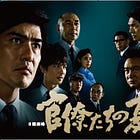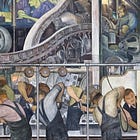2024: The Year in Review(s)
Jane: Well, it’s been another year chez Psmiths. And a big one, too: we more than tripled our number of subscribers, one of your reviews spent a day at #1 on Hacker News, and I started getting emails from PR flacks offering review copies. (We’ll know we’ve really made it when Oxford University Press gives in to my requests for free books.) All despite cutting our posting frequency in half!
Oh, and we had another baby, which is why we cut our posting frequency in half.
I wish I had been able to write more; I went from 24 reviews written in 2023 to 7 in 2024. But you and our intrepid guest reviewers did a great job picking up my slack, and I hope I’ll be back in the saddle for 2025. I have a hefty backlog of stuff I’ve read before and want to talk about, a growing pile of books I’ve bought because they sounded great but haven’t had time to read yet, and of course my favorite category is always the books I pick up by chance and find I desperately need to tell everyone about. (Prior examples of reviews in that category include Surprised by Joy, How to Read a Tree, Akenfield, and Burn — if I have to send an excerpt from whatever I’m reading to more than two different people, there’s probably a review in it.) I have no idea what I’ll read this coming year that hits that spot, but I’m excited to find out.
And yes, I promise I will finally finish reading Philosophy Between the Lines so we can do a joint review. Let me just wrap up this trashy sci-fi novel first.
John: Yes, 2023 really was the honeymoon year for the Substack: we were young and sprightly and full of energy, brimming with ideas, nothing could stop us. But then between the pregnancy, the baby, and the job, this year was more of a grind. I think the fact that we made it to the end, though, is a pretty good sign that this project actually has legs. Surely having gone through a rough patch and carried on with something regardless is correlated with longevity.
Do you feel that the nature of what we’re doing here has changed? I guess I shall now reveal one of the secret origins of this Substack: back in 2016 (argh, we’re old) I began writing an email to my friends at the end of each year, with synopses of my favorite books I’d read that year. These summaries gradually got longer and more elaborate, and friends started asking if they could forward them to people, and eventually I bit the bullet and did what I swore I would never do. I started to poast.
So in the early days that’s what this place was for me: a place to tell you and my other friends about what I was reading, because only my friends knew this place existed. The other audience was: myself! I wanted a durable record of my various theories and obsessions, and of what thoughts particular books had sparked. Plus, I’d stopped writing stuff under my real name and wanted a creative outlet.
But at some point, the nature of the project shifted. We haven’t tried incredibly hard to publicize this place, but our reviews are now regularly read by tens of thousands of strangers. Once that happens, you feel a bit more pressure to deliver. And you start to wonder how best to capitalize on your influence, what ideas and conversations you want to inject into the noosphere, what training data you want to seed our posthuman descendants with. It all gets a little bit less playful and a little bit more like work. I’ve tried to fight against this tendency: (1) by not doing any of the parasocial self-promoting influencer stuff (I barely even respond to the comments!), and (2) by deliberately writing a lot of really niche stuff that really is just for me. This is one esoteric purpose of my much-despised reviews of math textbooks.
What do you think? What is the point at which too much attention would lead you to roll a new pseudonym and start again? Lately I’ve been thinking a lot about that line from Belloc: “A man is no more meant to live by writing than he is meant to live by conversation, or by dressing, or by walking about and seeing the world.”
Jane: I was just looking back at my very first book review, written when I had just suggested we start the Substack, and it’s hilariously brief. Really it’s just “hey, you guys, this is a cool book, you should check it out.”1 And then you finished your very first book review and I went “oh no, he has an intellectual project.” But I’m glad you did, because then I had to come up with one of my own — I had to actually say something — and it pushed me to think and write things I would never have pushed myself to do if I weren’t trying to keep up.
A good book review does some combination of 1) explaining what the book has to say and 2) expressing the reviewer’s own thoughts on the matter. (That way, of course, you get both the novelist's ideas as well as the critic's thinking.) Different reviews hit this balance differently: sometimes I come away from a book desperate to tell people about, say, the ways fuel choices change society, and sometimes I really want to talk about some interesting idea the book sparked for me (is wokeness WEIRD? why do I hate contemporary fantasy so much?). I find the first kind much easier to write — synthesizing, summarizing, picking out the good bits, are all way more straightforward than forcing the amorphous mess of ideas in my head into some kind of structure — so I’ve been doing a lot of that this year. I do have a whole list of books I’d already read when we started this project, books about which I want to say interesting novel things, and I’m waiting to get to them until I feel like I can do them justice.
But even with that first kind of book, there’s a reason the “good bits” are good: something about them is rhyming with the things I already think, and I’ve needed to train myself to draw that out and articulate it. Writing a book review is much more like having conversation than it is like writing an essay, except you’re talking to the book. (Or maybe, if you’ll pardon the nerd analogy, it’s more like playing an RPG than like writing a short story — having something to bounce off of and react to is a tremendous aid to thought and creativity. Possibly I have just recreated “Tradition and the Individual Talent”?)
Anyway, I agree that the Substack feels more like work than it did when we started, but that’s a good thing. When you’re in the trenches (with job or baby and especially with both!), anything that doesn’t feel like at least a little bit like work falls by the wayside. I haven’t baked anything fancy in more than a year. My garden is a catastrophe. I have two three four half-finished sewing projects languishing in a cupboard. If we were only writing for personal gratification, we would’ve stopped. And I’m really glad we didn’t, because I quite like some of the things we’ve written, I sometimes get emails from people telling me it’s made a difference to them, and we’re tantalizingly close to getting that little “bestseller” checkmark next to our names on Substack. But most of all, I’m glad we’re doing this because I really enjoy both the writing (at least, when it doesn’t feel like pulling teeth) and the reading what you’ve written.
Let’s stick with the every-other-week posting schedule, though.
John: Going back and reading that first review of the Zhuchkovsky book causes me to cringe in a little bit the same way that reading my adolescent poetry does. Parts of it (especially the opening) are so stilted and awkward, and the pacing is off throughout. One benefit of forcing yourself to write regularly is just that it also forces you to find your authorial voice and keep it. This is also a secret benefit of writing without an editor — it forces me to take on the merciless editor’s role myself, coming back through a draft with my virtual red pen, skewering adverbs and deleting circumlocutions. It’s like climbing without a safety net, or writing code without somebody else to review it, or not having a boss who can tell you when you’re screwing something up. You get better quickly, or you die.
If I have any regret about my posting this year, it’s that I wrote a lot of stuff about my usual hobbyhorses and relatively little that was offbeat. On some level I can’t complain: the reviews about math pedagogy or approaches to leadership or violent but neglected periods of history get a lot of clicks. But it’s been a while since I wrote a review of an out-of-print book about a guy who fell through a thundercloud, or about sailing and epistemology (twice!), or about whatever the hell this one is about.
So if I have any resolution for 2025, it’s to return a little bit to my weird roots and write about more varied topics than just hill people, startups, China, and early childhood education. Also I haven’t reviewed any fiction since I re-read that Dostoevsky novel, and that’s gotta change.
While I’m dragging up stuff from 2023, do you have any favorites from back then that you think our very many new readers should check out?
Jane: I’m still very fond of my weird review about language and social signaling and my take on Robert E. Howard’s Conan stories. There are also several reviews about all the things you can notice in the physical world that I liked, especially the long rambly one about American houses and development patterns and the one about trees. It just makes daily life so much richer when you understand how things around you got to be the way they are! And since you and the children have now heard all of my examples multiple times, I’m glad the Substack lets me branch out. (rimshot)
As far as joint reviews go, I think our take on Who We Are and How We Got Here was especially fun to write — I really miss writing together. Esoteric writing joint review when?
All that said, though, I spent an awful lot of this year reading old2 sci-fi while holding a sleeping baby. I added a number of books to my “I think I’ll probably want to review this, so I’m going to hold off until I can do a good job” pile, but I did read a couple of nonfiction titles that almost merited reviews. Not that they were bad — I just decided I had about one paragraph worth of interesting things to say about each of them, and I shoot for more than that in a book review. But what better place to share a few random paragraphs than our end-of-year post?
America’s Cultural Revolution: How the Radical Left Conquered Everything, by Christopher F. Rufo: Intellectual history of the “Great Awokening,” and I think on a purely descriptive level it would be interesting even to people who hate Rufo. (I assume they would just say “yes, and that’s good.”) The essential claim is that all the trends that seemed new c. 2015 actually began in the 1970s, which were a lot more insane and violent than I was taught in history class. The ideas didn’t go away, though; they just spent a few decades quietly incubating in the academy. When they finally emerged they had been domesticated, bureaucratized — one might even say “longhoused” — but it’s all surprisingly recognizable.
The Storm Before the Storm: The Beginning of the End of the Roman Republic, by Mike Duncan: Way back when, an elderly Latin teacher loaned me a history of the late Republic that had been hers as an student. It was great, and when I decided I needed to spend more time thinking about the Republic in order to properly perform my gender (we’ve already established that the Empire is for boys) I realized I had absolutely no idea what it was called or who wrote it. So I ended up with Mike Duncan instead. (I liked this much better than Tom Holland’s Rubicon, which I also read.) I’m not a podcast person, which means this was my first exposure to Duncan, and I thoroughly enjoyed it — he’s in-depth and even-handed, even when it’s very tempting to take sides. New proposal: when discussing the future of America, don’t indulge Rome analogies from people who don’t know which Gracchus brother came first.
Late Admissions: Confessions of a Black Conservative, by Glenn Loury: This was hard to read because approximately once every three pages, I wanted to throw it at the wall and yell at the author to stop smoking crack and sleeping around. (Uh, spoiler alert I guess?) But it’s well-written, and it scratched the same “but what did the past feel like” itch that C.S. Lewis’s memoir did. Also of note: Loury’s political trajectory is structurally identical to J.D. Vance’s. 1) Get mad that your people have some serious problems. 2) Write about how messed up your people are. 3) Get very popular on the basis of your writing about how messed up your people are. 4) Realize that the people who like you because you’re writing about how messed up your people are really don’t like your people and are using you as a stick with which to beat them. 5) Decide that even if your people are messed up and have serious problems, they’re still your people and you need to be on their side whether they like it or not.
Was there anything you liked but didn’t end up reviewing?
John: Oh totally, there was a ton that I read and loved but didn’t get to review. Like you I’ll mention just three:
City of Djinns: A Year in Delhi, by William Dalrymple: As I said last year, William Dalrymple is by far my favorite travel author. So it’s a delight that he’s able to write with the same verve about staying in one place. But Delhi is “a groaning necropolis, a graveyard of dynasties. Some said there were seven dead cities of Delhi… others counted fifteen or twenty-one… scattered around the city there were human ruins too… All the different ages of man were represented in the people of the city. Different millennia co-existed side by side. Minds set in different ages walked the same pavements, drank the same water, returned to the same dust.” So this actually is a travel memoir, not about roving across Asia, but about descending through the geological strata of Delhis many dead cities, each chapter peeling back another layer of the necropolis and unearthing new relics.3
His Master’s Voice, by Stanislaw Lem: Stories where humanity receives an alien transmission whose contents promise inconceivable knowledge and commensurate dangers are one of my favorite subgenres of science fiction (forget that dumb Carl Sagan novel, try Macroscope instead). His Master’s Voice is Lem’s riff on this trope, but to my delight it turned out to be as much a novel about the philosophy of science as it was an information theoretic thriller. The alien broadcast is a stand in for all of nature, in that it is raw evidence without a built-in hermeneutic key. To make any progress, the scientists must bring their own pre-scientific beliefs and prejudices to bear, in a dark echo of Einstein’s quip that “theory can be tested by experience, but there is no way from experience to the construction of a theory.”
The Ballad of the White Horse, by G.K. Chesterton: Some of you are already sold by the description “epic poem about Alfred the Great’s battle with the Vikings by G.K. Chesterton.” But this isn’t just a morality tale about the triumph over pagan darkness, and it isn’t just a series of clever Chesteronian flourishes either (though there are many of those). Really this is a love letter to the English language. It must be read out loud. You must take each of those crunchy one-syllable words of Anglo-Saxon origin, and feel the way your face moves as you pronounce them. “Wrought.” “Prow.” “Swarm.” “Slain.” Roll them around in your mouth until you experience semantic satiation and can begin to love the words just for how they sound. Whether English be the tongue of your fathers or a strange new language that you’re just starting to learn, this poem will bring you closer to the soul of it.
Jane: That’s all, folks! We’re taking a few weeks off, but we’ll be back sometime after Christmas (Julian Calendar) with new and exciting reviews. In the meantime, if you need more Psmiths in your life, check out our backlog. Or consider these personalized recommendations based on some of our most popular posts this year:
If you liked John’s review of Math from Three to Seven, try:
If you liked Jane’s review of Sick Societies, try:
If you liked Jane’s review of Fears of a Setting Sun, try:
If you liked John’s review of The Education of Cyrus, try:
If you liked John’s review of The Real North Korea, try:
If you liked our joint review of Family Unfriendly, try:
And as always, the greatest compliment you can give is to share our work with your friends. We also read all our comments, enjoy hearing from our readers, and mostly answer our emails.
I’ve considered going back and rewriting it, because I would approach the whole thing really differently today and there are lots of things I want to say about it! But I do not have the time, so all the classics nerds will have to wait until I read another classics nerd book.
Well, “old” — I’ve been working my way through pre-2010 Hugo and Nebula nominee lists and some of the things I read this year I actually remember buying in paperback (at Borders!) but never actually got into.
It’s the real life version of a claassic RPG trope — the multi-layered megadungeon where each level is built on top of some even older ruin with even more valuable treasures and even more dangerous foes.





























More reviews of math books please.
"New proposal: when discussing the future of America, don’t indulge Rome analogies from people who don’t know which Gracchus brother came first." Indeed, And quite. And even yeeeah buddy.
I love the math textbook reviews.